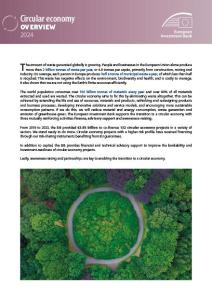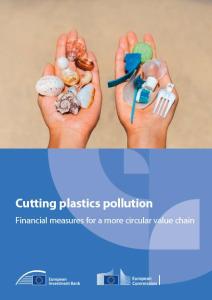Investing in a circular economy
The amount of waste generated globally is growing. Every year, 100 billion tonnes of materials are consumed, 90% of which is thrown away. This waste has negative effects on the environment, biodiversity and health, and is costly to manage. It also shows that we are not using the Earth’s finite resources efficiently. We are committed to reducing waste and creating a world where everyone can thrive by supporting the transition to a circular economy.

What is the circular economy?
The circular economy aims to eliminate waste altogether by changing the way we use resources. This can be achieved by extending the life and use of materials, rethinking and redesigning products and business processes, developing innovative solutions and service models, and encouraging more sustainable consumption patterns. The European Union aims to double recycled material use, in terms of its share of the economy's total material use, between 2020 and 2030. Recycled material accounted for 11.8% of material used in 2023, up from 10.7% in 2010.
IN FOCUS
Our support for the circular economy
We invested €5.1 billion in 153 circular economy projects across a range of sectors between 2020 and 2024. These projects help to conserve resources, reduce our impact on the climate and the environment, foster sustainable economic growth, generate new jobs and help secure the supply of critical materials.
Our partnerships
Investing in the circular economy can be a true game changer. We work closely with other financial institutions in Europe and beyond to support greater circularity.
Joint Initiative on Circular Economy
In 2019, we launched the Joint Initiative on Circular Economy (JICE) together with the European Union’s largest national promotional banks and institutions to boost investments in the circular economy in Europe.
MDB circular economy working group
We are an active member of the multilateral development bank (MDB) circular economy working group, which supports the transition to greater circularity within the institutions themselves and externally. MDBs can help to reduce the risks faced by the private sector and help meet public sector investment needs.
The Circular City Centre - C3
We joined forces with the European Commission to launch the The Circular City Centre - C3, a competence and resource centre within the European Investment Bank that supports EU cities in their circular economy transition.
Our stories
Individual stories speak far louder than figures and charts. Learn how our work is leading the way to a more circular future.
Our publications
Understanding the circular economy landscape is key to taking action. Explore our latest research, economic studies, surveys and other resources.
The circular economy in motion
How Multilateral Development Banks are advancing the transition
Circular economy: Overview 2024
An overview of the European Investment Bank’s work in circular economy
Cutting plastics pollution
Financial measures for a more circular value chain



